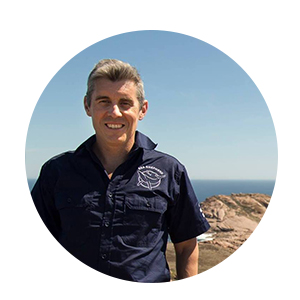News
Our Clients Are Whales – That’s Who We Represent
Wednesday, 12 Aug, 2020
Commentary about whale ecotourism by Sea Shepherd Australia's managing director, Jeff Hansen
With the recent couple of incidents of people being injured by whales during whale swims off Exmouth in Western Australia, home to the Ningaloo Reef, Sea Shepherd has been contacted for comment. We note that these incidents are rare given that to date, some 10,000 people have been swimming with whales in this area.
The tour operators followed the government guidelines, however, whales don't follow guidelines, and with the inquisitive older calf coming over to investigate the group of swimmers closer, the mum possibly reacted and rushed in to pick up the calf and accidentally knocked a swimmer with one of her massive pectoral fins. The humpback swim program off Exmouth is a trial, so I'm sure there are still learnings to be had.
Whales face an ever-growing number of human-made threats, from seismic for oil and gas companies, naval sonar, ship strike, fishing gear entanglement, plastic and noise pollution, and of course climate change.
"The more we love whales, the more we will want to know more about them and the threats they face, and as a result, the greater the movement to protect them. From changing ships to minimise noise pollution, to minimising our plastic use or seeing all seismic banned in the world's oceans."
- Jeff Hansen
In an ideal world, we would just leave our oceans and nature be, understanding the important roles whales play in the health of our oceans. Whales are the farmers of the sea, with their flocculent plumes fertilizing the oceans of nitrogen and iron, feeding phytoplankton and zooplankton, which has a flow-on effect of giving us most of the air we breathe, fighting climate change and allowing fish populations to recover. Quite simply, an ocean without whales, is a planet without people and in an ideal world, we would all understand this. We need to give whales the space they need, to recover and allow their numbers globally to bounce back as a critical species in maintaining the planet's primary life support system, our oceans. Putting the health of our whales first is putting humanity first.
Whales are highly intelligent and socially complex beings; they are truly the ocean's deep thinkers. Yet, like us, when under threat they too react and can make rash decisions or rapid movements, whether as a result of ship noise proximity, or hunting orcas in the area. We don't know what the past hours of days have been like for these leviathans of the sea; they could have been up all night protecting their baby from hunting tiger sharks and as a result, are not in a calm state, once again reinforcing the need for prior behaviour observation. Whales also behave differently when in transit or migration, compared with resting. For instance, in the waters of Tonga, they are resting, and off Ningaloo, they are on the move.
Similarly in Tonga, I know of very reputable operators like Whale Discoveries that interact with the whales first with their vessel, politely and slowly, with the idea that if the whale doesn't accept the boat, it's not going to accept swimmers. Whale Discoveries will also report other operators not acting respectfully of the whales and putting them at any risk. Reading a whale's behaviour and acting appropriately takes experience, like getting out of the water if an animal shows distress, a sudden change in behaviour or if it moves away fast. As a result, they suggest that large numbers of swimmers (nine plus a guide and photographer), are very hard to keep organised or controlled. So, as a result, they swim with only four people plus a guide, where the smaller the group, generally the more chilled, enjoyable and respectful the encounter.
Whales don't like to be taken by surprise. So in fact, knowing the boat is there helps and limits the whales stumbling across a group of city slickers splashing around, looking to tick the 'swim with the whale' box.
I personally know that there are many people at the Western Australian Department of Biodiversity Conservation and Attractions that care deeply for the welfare of whales. Given the many times key people there have risked their lives over the years to free whales entangled in fishing gear, they will provide any further recommendations on how to best manage whale and human interactions, to minimise impacts to both whales and people.
I must say, being in the ocean and by chance having a close encounter with a forty-tonne humpback whale is one of the most amazing experiences one can have in the ocean, though I have been very lucky to also have many other amazing experiences with the clients that Sea Shepherd represent, such as long-finned pilot whales, manta rays and even tiger sharks. These experiences have further enhanced my resolve to defend them and the ocean they call home.
In general, most ocean experience companies, be that swimming with whales or whale sharks, are run by people that care deeply for our oceans, and want to showcase the beauty we have off our coasts and hope that more people become ocean and whale defenders through education.
- Jeff Hansen
Humans and whales are inquisitive species, and often it's a case of who is checking who out, however putting the health of our whales first is the utmost priority, for whales can live on the planet without us, but we can't live on the planet without them. So continuing to strive for a balance where people become whale and ocean defenders through experiences and education without compromising whale behaviour is the goal here, until such time that we really understand the true value of our oceans, as our primary life support and just leave our oceans be.

Jeff Hansen
Managing Director of Sea Shepherd Australia